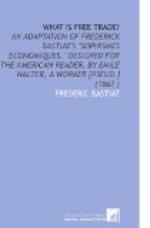Here protection commences, because, according to the petitioners, national labor commences.
“The third comprises perfected articles which can in no way serve national labor; we consider these the most taxable.”
Here, labor, and with it protection, reach their maximum.
The petitioners assert that foreign labor injures national labor; this is the error of the prohibitive school.
They demanded that the French market should be restricted to French labor; this is the end of the prohibitive system.
They insisted that foreign labor should be subject to restriction and taxation; these are the means of the prohibitive system.
What difference, then, is it possible to discover between the petitioners of Bordeaux and the advocate of American restriction? One alone: the greater or less extent given to the word labor.
The protectionist extends it to everything—so he wishes to protect everything.
“Labor constitutes all the wealth of a people,” says he; “to protect national industry, all national industry, manufacturing industry, all manufacturing industry, is the idea which should always be kept before the people.” The petitioners saw no labor excepting that of manufacturers; so they would admit that alone to the favors of protection. They said:
“Raw material is devoid of all human labor. For that reason we should not tax it. Fabricated articles can no longer occupy national labor. We consider them the most taxable.”
We are not inquiring whether protection to national labor is reasonable. The protectionist and the Bordelais agree upon this point, and we, as has been seen in the preceding chapters, differ from both.
The question is to ascertain which of the two—the protectionists or the raw-materialists of Bordeaux—give its just acceptation to the word “labor.”
Now, upon this ground, it must be said, the protectionist is, by all odds, right; for observe the dialogue which might take place between them:
The PROTECTIONIST: “You agree that national labor ought to be protected. You agree that no foreign labor can be introduced into our market without destroying therein an equal amount of our national labor. Yet you assert that there is a host of merchandise possessed of value (since it sells), which is, however, free from human labor. And, among other things, you name wheat, corn, meats, cattle, lard, salt, iron, brass, lead, coal, wool, furs, seeds, etc. If you can prove to me that the value of these things is not due to labor, I will agree that it is useless to protect them. But, again, if I demonstrate to you that there is as much labor in a hundred dollars’ worth of wool as in a hundred dollars’ worth of cloth, you must acknowledge that protection is as much due to the one as to the other. Now, why is this bag of wool worth a hundred dollars? Is it not because that sum is the price of production? And is the price of production anything but that which it has been necessary to distribute in wages, salaries, manual labor, interest, to all the workmen and capitalists who have concurred in producing the article?”




